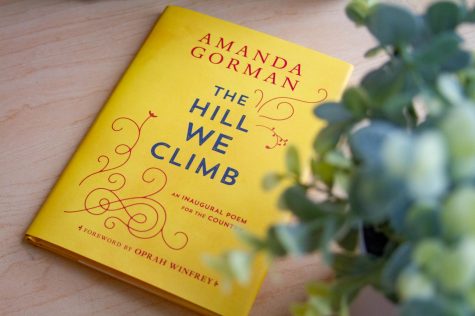Inauguration inspiration
Amanda Gorman’s uplifting message in “The Hill We Climb”
May 7, 2021

On January 20, during a blustery winter morning in Washington D.C., a woman in a yellow coat and a red headband recited a poem. Her words set off waves of passion and motivation across the United States in a matter of minutes.
Inaugural poet Amanda Gorman’s published book, “The Hill We Climb”, acknowledges a country severed by division and pain, but also offers a much-needed message of hope and healing. Her honest, optimistic, resolute work was the perfect beginning for President Biden’s time in office.
The book features a foreword by Oprah Winfrey, who praises Gorman’s powerful presentation on Inauguration Day.
“Everyone who watched came away enhanced with hope and marveling at seeing the best of who we are and can be through the eyes and essence of a twenty-two-year-old, our country’s youngest presidential inaugural poet,” Winfrey said.
Gorman’s poem begins with questions and observations about the lack of progress in the United States. Her words try to unite the American public by acknowledging how social unrest, a worldwide pandemic, and other national hardships have changed the structure of society:
“We’ve braved the belly of the beast.
We’ve learned that quiet isn’t always peace,
And the norms and notions of what ‘just is’
Isn’t always justice.”
In addition to highlighting how America struggled and prevailed through the year 2020, Gorman mentions how the diverse ways of life among Americans should be celebrated, not condemned. She speaks about the importance of solidarity, both in the present moment and beyond:
“To compose a country committed
To all cultures, colors, characters,
And conditions of man.
And so we lift our gazes not
To what stands between us,
But what stands before us.
We close the divide,
Because we know to put
Our future first, we must first
Put our differences aside.”
Gorman’s unifying proclamation in the verse above is compelling and powerful, and the final stanza of her poem radiates positivity and encouragement. She tells her listeners that while respite and relief may eventually be found, the courage to embody them must be discovered first:
“When day comes, we step out of the
shade,
Aflame and unafraid.
The new dawn blooms as we free it,
For there is always light,
If only we’re brave enough to see it,
If only we’ve brave enough to be it.”
“The Hill We Climb” is only thirty-two pages, each one with only a verse or two printed on it. Ten dollars may seem like a steep price for one poem, but owning a physical copy of Gorman’s words makes them all the more meaningful.
This poem makes you think; it triggers emotional reactions and responses. Each page contains space for any notes, praises, or questions the reader may have as they study Gorman’s work.
Reading this poem with a pen in hand is the key to an optimal experience.
Writing thoughts and opinions alongside Gorman’s carefully crafted verses creates a respectful, powerful conversation on every page, an opportunity unavailable to those who choose to simply watch the recorded performance online.
Both Gorman and her inaugural poem represent the ideal future leadership of the United States: intelligent, composed and inspiring. “The Hill We Climb” is her first notable work, but many more literary masterpieces will undoubtedly follow.
Gorman’s poem serves as an urgent call to action in the fight for justice, peace and reconciliation, but reminds her fellow Americans that cooperation and kinship possess more strength than an act of brute force or aggression. Her message is one worth listening to.
“We lay down our arms
So that we can reach our arms to one
another.
We seek harm to none, and harmony for all.”




























































































